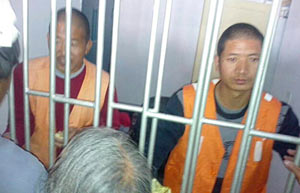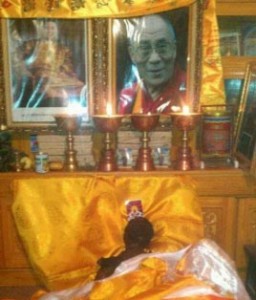
Tsundue and Gedun Tsultrim following their detention.
The two monks, Tsundue and Gedun Tsultrim, were imprisoned on November 21, 2012, as they were on their way to pay their respects and say prayers at the home of Wangchen Norbu, a 25-year old Tibetan man who had died after self-immolating two days earlier near Kangtsa Gaden Choepheling monastery in the Kangtsa area of Qinghai. Other monks and laypeople were also blocked from going to Wangchen Norbu’s house, and some of them prayed by the road where they were stopped by police and officials.
The imprisonment of the monks, who are believed to have offered prayers at their monastery on the day of Wangchen Norbu’s self-immolation, signals the more aggressive and formalized response by the Chinese authorities to the wave of self-immolations in Tibet since 2009. This has involved the imposition of long sentences to Tibetans accused of ‘inciting’ or in some cases witnessing self-immolations, where no evidence of involvement exists. This is the first known case of monks being sentenced for praying, or attempting to pray, for a Tibetan who has self-immolated.
Both lay people and monks who had been attempting to walk to Wangchen Norbu’s home to carry out traditional prayers were subject to harassment and intimidation afterwards. The sentencing of Tsundue and Gedun Tsultrim is likely to have been intended to send a warning to others. According to one Tibetan who spoke to sources, it also appears to indicate that they took responsibility for organizing the prayers in order to protect others.
Tsundue, who is in his late twenties, and Gedun Tsultrim, who is 30, have been imprisoned since their detention in November 2012, but news of their sentencing last month has only just emerged from two Tibetan sources in exile. Details of the charges against them and their current whereabouts are not known.
According to the same exile Tibetan sources, Tsundue was accused of being the organizer of a prayer ceremony following the self-immolation at his monastery, Bido (བིས་མདོ་དགོན་) in the neighboring township to Kangsta in Xunhua (Do-wi) Salar Autonomous County in Tsoshar (Chinese: Haidong) prefecture, Qinghai. He was also accused of being one of the main monks intending to lead the traditional prayers at Wangchen Norbu’s home two days after he self-immolated. Gedun Tsultrim, who was also a monk at Bido monastery in Bido township, was accused of collecting offerings made by monks for Wangchen Norbu’s family, and for organizing monks to go to his family home for prayers.

Wangchen Norbu’s body, draped in khatags (Tibetan white blessing scarves).
In January a Tibetan monk named Lobsang Kunchok was given a death sentence suspended for two years (likely to be commuted to life in prison) and his nephew Lobsang Tsering sentenced to ten years for “intentional homicide” connected to the self-immolation of eight Tibetans in Ngaba (Chinese: Aba), although five of the self-immolations never occurred. The two Tibetans were caught up in a new drive by Chinese authorities to criminalize the self-immolations in Tibet. The severe sentences were the first to be imposed against individuals who have allegedly ‘incited’ or ‘coerced’ Tibetans to self-immolate. (ICT report, Distress at death sentence for Tibetan accused of ‘inciting ‘self-immolation’).
The sentencing and elaborate propaganda efforts surrounding the trial of the two Tibetans (news of the alleged conspiracy was covered in the official press and state television) show a hard line and more systematic response by the authorities to recast the self-immolations as criminal acts and attribute blame for the self-immolations to ‘outside forces.’ (ICT report, Storm in the Grasslands, Self-immolations in Tibet and Chinese Policy).

